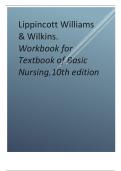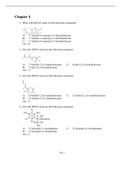Lippincott Williams & Wilkins. Workbook for Textbook of Basic Nursing,10th edition eddnd edition CHAPTER 1 SECTION I: TESTING WHAT YOU KNOW Activity A 1. b 2. c 3. d 4. a Activity B 1. c 2. a 3. d 4. b Activity C 1. True 2. True 3. True 4. True 5. False. Nursing curricula should include both theoretical knowledge and practical experience. Activity D 1. Hippocratic 2. Italy 3. Caduceus 4. nourish Activity E 1. The Nightingale lamp represents the warmth of caring. The light of the lamp symbolizes the striving for excellence. The oil represents the energy and commitment of the nurse to heal others. 2. The Nightingale lamp is also known as the “Lamp of Nursing” or the “Lamp of Learning.” Activity F Activity G 1. Bellevue Hospital School of Nursing in New York; Connecticut Training School in New Haven; and Boston Training School at Massachusetts General Hospital were established on the basis of the Nightingale plan. 2. Until the 1800s, few women cared for sick prisoners or prostitutes. Nursing was considered the most menial of all tasks, and the least desirable . This period is known as the dark ages of nursing. 3. Many clients are homeless, unemployed, or underemployed. Many people have no health insurance. Devastating diseases, such as acquired immunodeficiency syndrome (AIDS) or tuberculosis, are becom ing more prevalent. These factors create a need for more healthcare in the public sector. 4. Individual attributes required to be a nurse include a strong sense of responsibility and the highest standards of integrity. Personal conviction and flexibility are necessary foundations. A nurse must be well educated and must integrate the art and the science of working with people. 5. Clients usually feel more comfortable when nurses are easily identifiable and distinguishable from other staff. For example, a name tag is required whenever you give nursing care, no matter where you are employed. 6. A cross (based on the Maltese Cross) and the Star of David are the religious symbols that are represented on nursing pins. 7. World War I marked the first emergency training of nurs es. The Army School of Nursing was established; Annie W. Goodrich (1876 –1955) wrote the curriculum. Hundreds of women were trained in this abbreviated program. SECTION II: APPLYING WHAT YOU KNOW Activity H 1. a.The principles taught by the Nightingale Nursing School are • Cleanliness is vital to recovery. • The sick person is an individual with individ -ual needs. • Nursing is an art and a science. • Nurses should spend their time caring for oth -ers, not cleaning. • Preventi on is better than cure. • The nurse must work as a member of a team. • The nurse must use discretion but must followthe physician’s orders. • Self-discipline and self -evaluation are impor -tant. • A good nursing program encourages a nurse’sindividual development. • The nurse should be healthy in mind andbody. 1 ANSWERS • Teaching is part of nursing. • Nursing is a specialty. • A nurse does not graduate, but continues tolearn throughout his or her career. • Nursing curricula should include both theoreticalknowledge and practical experience. b. The Nightingale School introduced a nursing course that was 1 year in length and included both classroom and clinical experience, a major innovation at that time. The S chool also included other innovations, such as • Establishment of a nurses’ residence • Entrance examinations and academic and per -sonal requirements, including a character reference • Records of each student’s progress —laterknown as the “Nightingale plan,” a m odel for current nursing programs • Records of employment of students after gradu -ation, or a formal register -the beginnings of nursing practice standards 2. The factors that are expected to continue in the 21st century are • Higher client acuity in hospital an d long -term settings: Because of limitations on payment for healthcare, hospital stays are markedly shorter than they were just 10 years ago. Clients in all healthcare facilities are more acutely ill than in years past. • Shift to community -based care: Most clients now receive healthcare outside acute care settings. Today’s nursing is delivered in a much wider range of settings than in the past. • Technology: Nurses, clients, and family members often must learn to operate highly sophisticated equipment to manag e conditions in the home. • Social factors: Many clients are homeless, unemployed, or underemployed. Many people have no health insurance. Devastating diseases, such as acquired immunodeficiency syndrome (AIDS) or tuberculosis, are becoming more prevalent. These factors create a need for more healthcare in the public sector. • Lifestyle factors and greater life expectancy: Today’s society and the healthcare industry emphasize prevention of disease, healthy lifestyles, and wellness programs. Greater life expecta ncy is causing huge growth in the areas of extended, long -term, and home care. • Changes in nursing education: Today’s nursing programs emphasize education over service to clinical sites. They identify specific objectives (outcomes) for students. • Autonomy: The women’s movement has influenced nurses, many of whom are women, to be more assertive and independent. Today’s nursing role is more collaborative, rather than nurses being subservient to physicians. SECTION III: GETTING READY FOR NCLEX Activity I 1. Answer: a, c, and e RATIONALE: Personal conviction and flexibility are necessary qualities for a nurse. A nurse must be well educated and must integrate the art and the science of working with people. Although the nurse may have an aggressive per sonality, he or she needs to adapt to meet the clients’ needs in an appropriate manner. The nurse needs to be aware of the client’s emotions, lifestyles, physical changes, spiritual needs, and individual challenges but need not be particularly spiritual. 2. Answer: b . RATIONALE: At the battlefield near Scutari, Turkey, Nightingale insisted on establishing sanitary conditions and providing quality nursing care, which immediately reduced the mortality rate. She did not seek more funds, medications, or continued education; instead, she believed that “Nature alone cures. Surgery removes the bullet out of the limb, which is an obstruction to cure, but nature heals the wounds. . . . Medicine assists nature to remove the obstruction, but does nothing more. And what n ursing has to do in either case, is to put the patient in the best condition for nature to act upon him.” 3. Answer: The correct sequence is b, d, c, a RATIONALE: One of the early outstanding figures in medicine was Hippocrates, born in 460 BC on the Greek is land of Kos. Phoebe, mentioned in the Epistle to the Romans (about 58 AD), is known as the first deaconess and visiting nurse. Fabiola, a Roman woman, is credited with influencing and paying for the construction of the first free hospital in Rome in 390 AD. In 1836, Pastor Theodor Fliedner established the Kaiserswerth School for nursing in his parish in Kaiserswerth, Germany. 4. Answer: a RATIONALE: The YWCA offers a 3 -month program to train women in simple nursing care. The American Red Cross has begun offering home nursing education to teach lay women. The Minneapolis Vocational High School provided first vocational school -based nursing program. Ass ociate’s degree nursing programs are offered by vocational education settings or community colleges. 5. Answer: b RATIONALE: The nurse would acquire additional qualifications to specialize in a particular field. Additional education and skills may help the nurse earn more money, but this should not be the nurse’s focus when working at a healthcare center. The nurse does not requ ire additional education and skills to provide primary healthcare or to improve the accuracy of his or her assessments. 6. Answer: a RATIONALE: The Greeks set up care centers called hostels or hospitals to care for the sick. People with incurable diseases and pregnant women were not admitted to these centers. Therapy was administered by priestesses. 7. Answer: a RATIONALE: When a client is being treated at home, it is important for the nurse to teach the client’s family members how to operate sophisticated equipment. This equipment makes accuracy in diagnosis and treatment possible. The nurse or healthcare person provides primary healthcare to the clients and not the family members. The nurse working in healthcare needs to understand higher levels of skills. It is not the responsibility of the family members to understand higher levels of skills. To reduce the expenses incurred on the client’s treatment, hospital stays may need to be reduced. 2 Copyright © 2012, Wolters Kluwer Health | Lippincott Williams & Wilkins. Workbook for Textbook of Basic Nursing,10th edition, by Caroline Bunk er Rosdahl and Mary T. Kowalski. 8. Answer: a, b, and d RATIONALE: Changes in nursing education is one of the most influential nursing trends. Because of limitations on payment for healthcare, higher lev - ANSWERS els of skill, specialization, and education are required; these influence nursing. Greater life expectancy is causing huge growth in the various areas of nursing. Limitations in payment for healthcare have caused shorter, not longer, duration of hospital stay. 9. Answer: c RATIONALE: From Florence Nightingale in the Crimea to the American Civil War, Korea, Vietnam, and continuing to the wars of the 21st century, nurses have always played a vital role. World War I marked the first emergency training of nurse s. The U.S. Cadet Nurse corps was established during World War II. 10. Answer: a, b, and c RATIONALE: The principles of prevention, working as a member of the team, and training are increasingly important today in a healthcare system in which clients’ conditions are more medically complex and clients move quickly from one healthcare setting to another. Nursing is an art and science. The nurse must use discretion but must follow physician’s orders. 3 Copyright © 2012, Wolters Kluwer Health | Lippincott Williams & Wilkins. Workbook for Textbook of Basic Nursing, 10th edition, by Caroline Bunker Rosdahl and Mary T . Kowalski.





